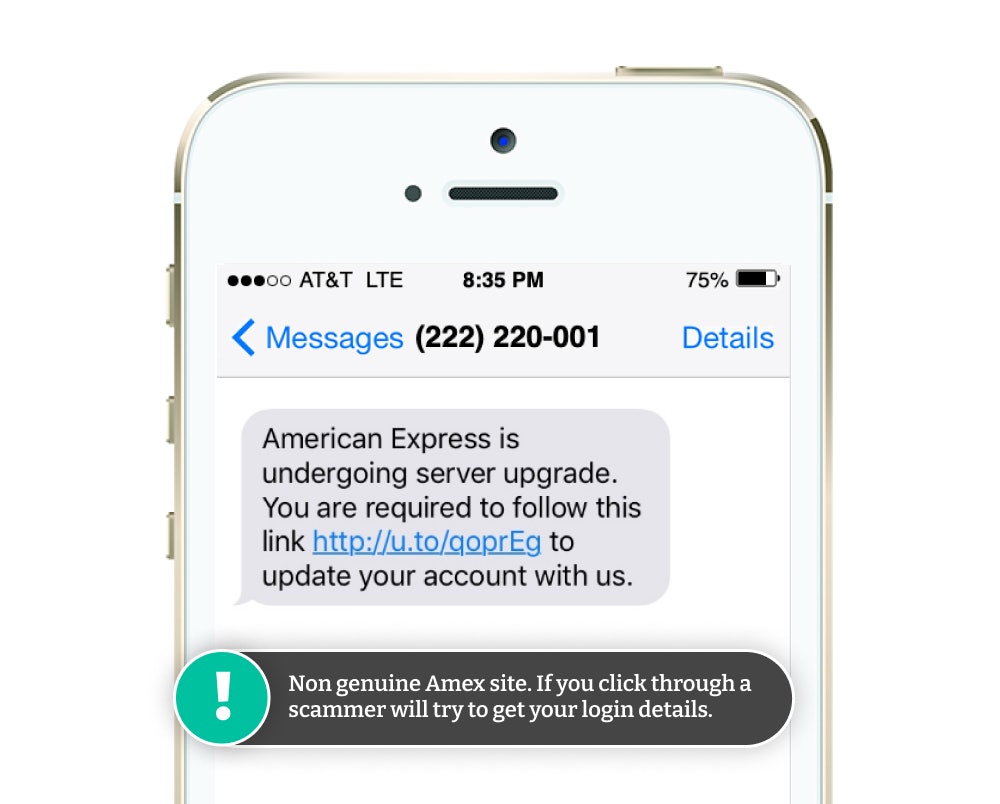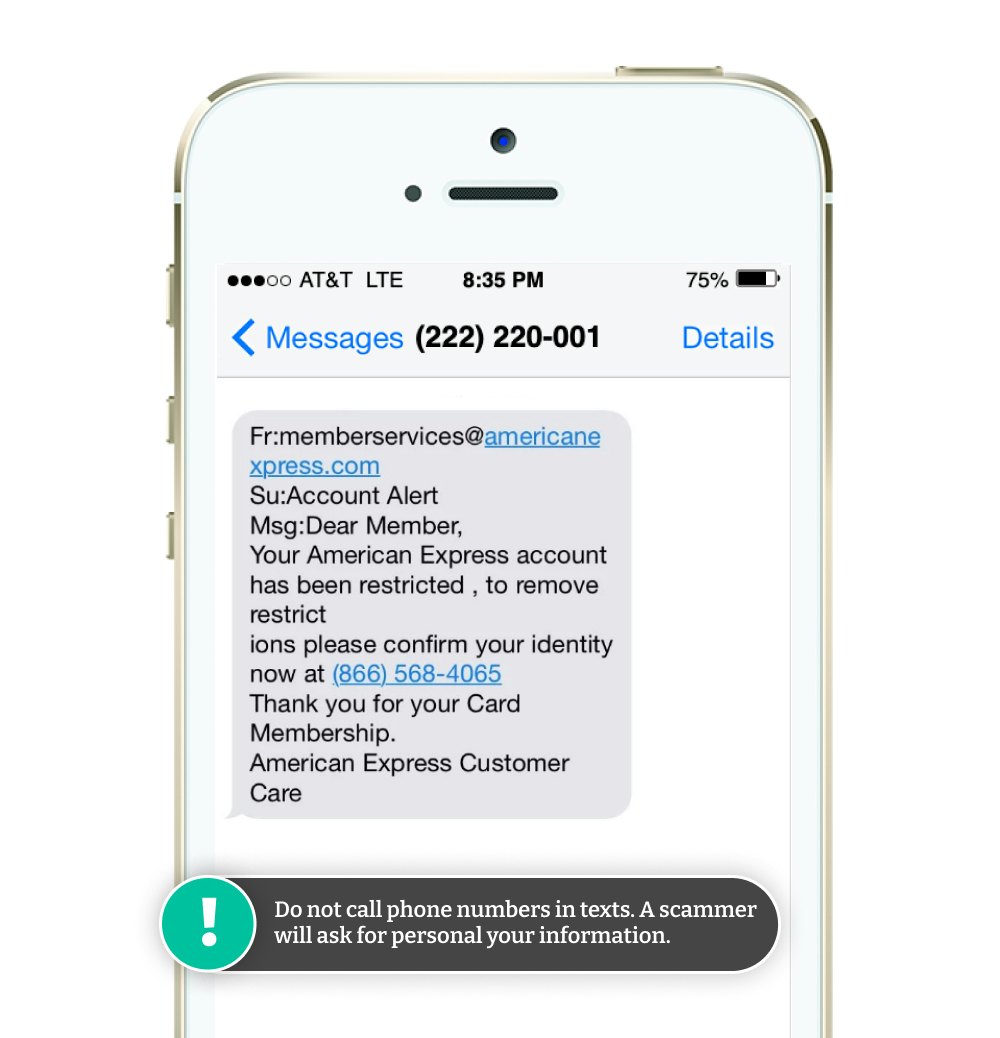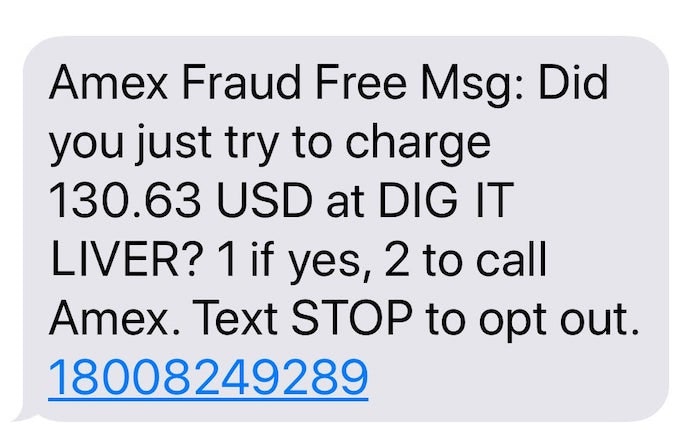- Spotting Fake Amex Fraud Text Alerts
- Delete Amex Fraud Text Messages
- Real Amex Fraud Text Alerts
- Amex Won't Ask For Your Personal Information via Text
- Report Fraudulent Text Messages
- What to Do If You Fall for a Fake Amex Fraud Text Alert
- Frequently Asked Questions
Amex fraud text alerts are real—when Amex recognizes suspicious activity or you make a purchase over $1000, you'll get a text notification. You may need to confirm whether the transaction was legitimate or not. You'll also get text alerts with two-factor authentication codes.
You can fine-tune when you get legitimate SMS/email alerts from Amex by adjusting the threshold via your online account.
However, there are plenty of texts circulating that claim they're from Amex but are attempts by scammers to get your login or card/account information. We help you identify these so you can delete them immediately.
If you ever receive a text alert from American Express, don't call the phone number or follow the link in the text. Instead, log into your Amex account directly from the website or app or call Amex from their official phone number:
- Phone: 1-800-528-4800
- Website: americanexpress.com
Stop Scam Texts from Reaching You
You can block spam and scam text messages from reaching you by blocking or filtering them from your inbox. Check your messaging app for this function or use a third-party app.
Spotting Fake Amex Fraud Text Alerts
Some key signs of fake Amex text messages should alert you to fraud immediately. These include:
- Threatening language, such as threats to suspend your account
- A request for personal information
- A link to a non-Amex website
- A request to confirm or update your account information

Example Scam Text MessageAmerican Express is undergoing server upgrade. You are required to follow this link http://u.to/qoprEg to update your account with us.

Example Scam Text MessageFr:[email protected]
Su:Account Alert Msg:
Dear Member, Your American Express account has been restricted. to remove restrictions please confirm your identity now at (866) 568-4065
Thank you for your Card Membership. American Express Customer Care
Delete Amex Fraud Text Messages
If you receive a text message and aren't sure if it's a real American Express message, the best thing to do is log into your Amex account via the website or app directly. Don't follow any links in the text or call the phone number listed.
If you identify a text message as a scam message, you should delete the message. Do not attempt to respond to the scammer or call them out on their scam. This will just flag your number as a real working number, and you may find yourself getting bombarded with more scam messages.
Real Amex Fraud Text Alerts
American Express does send fraud alerts via text message, but they don't contain a link to a website, just a phone number. Here's what they look like:

Amex Won't Ask For Your Personal Information via Text
American Express will never ask for sensitive account details by text, email, or phone. However, if they do call you, they will ask a few security questions to verify who you are.
Be wary of potential approaches on the phone or via text messages. A scammer may contact you and ask you to provide personal or account details. For example, a scammer may notify you of suspicious activity on your account, such as an overseas purchase of a substantial amount. They may ask if you recognize the transaction, and, if not, they may proceed to ask you to confirm your Amex credit card details so that they can investigate.
Beware of these situations as the scammer may already know your credit card number, asking you to confirm your identity by reading out the 4-digit security code printed on your card.
If you are at all in doubt about whether the email or call is genuine, contact Amex using the phone number on the back of your card.
If you visit an Amex website to log into your account, always check the URL before entering your username and password. Scammers can set up fake phishing sites that look like the real deal.
Report Fraudulent Text Messages
If you receive a fake Amex text message, you can report it by contacting Amex directly:
- American Express: 1-800-528-4800
- American Express Fraud Protection: Website
You can also report phishing texts and emails by forwarding them to [email protected]
What to Do If You Fall for a Fake Amex Fraud Text Alert
If you responded to a fake Amex fraud text alert, it's important to act quickly to minimize the damage.
Follow these steps:
- Call Amex and report the fraud. Amex may cancel your cards and issue you new ones if your account is at risk.
- Monitor your Amex account/s closely. Monitor your Amex accounts for the next few months and report any suspicious transactions directly to American Express.
- Report the scam to the credit bureaus. If you gave your Social Security number to the scammer, it's important to either freeze your credit or place a fraud alert.
- Protect your identity. You can never be too careful. An identity theft protection plan can put your mind at ease if you're worried about identity fraud (which can take years to recover from).



Comments